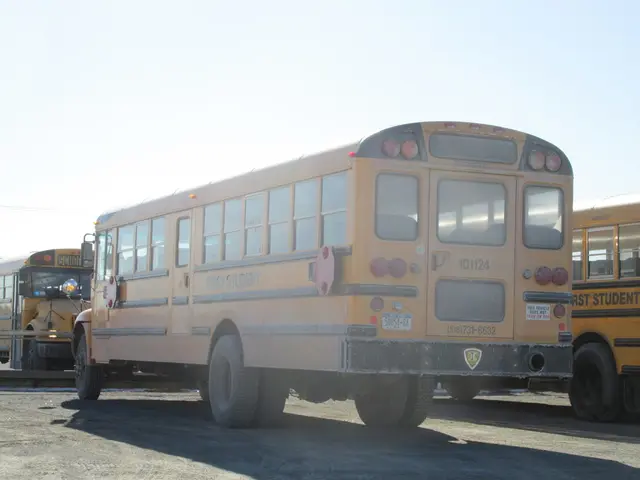A Rocky Road: Greens Face Internal Struggles After another Disappointing Election Result
Greens to Pursue Legal Action
It's game time for the Greens in Berlin, as they gather for a small party conference to regroup and heal the wounds from the 2025 federal election. After disappointing results, the departure of Habeck and Baerbock, and the end of their era as long-standing leaders, the Greens are searching for a fresh start in opposition, and they're not shy about airing their grievances.
The old loading docks at Westhafen, where Habeck and Baerbock once presented the coalition paper, now serve as the backdrop for these tumultuous attempt at self-reflection. Here, the party grapples with its course in opposition, and the hard lessons they've learned from the election. A revised, extensive guiding paper is the first step in this new voyage, but it also reveals the deep-seated conflicts the party is eager to confront.
From Climate Champion to Car Coupled in Confusion
The party is caught in a conundrum: Which direction to take now? More climate protection or a softer stance on refugee policies? Double-down in urban strongholds or invest in the neglected rural areas and East? The answer seems to be a mix of everything, as the Greens have lost support across the board during their years in government and the final stages of the election.
Around 700,000 former Green voters headed to the Left. The Union lured away some supporters, while the SPD milieu remained untouched. The Greens are like a driver searching for the right route, while the passengers debate the destination. It's incumbent upon the newly elected party leaders, Franziska Brantner and Felix Banaszak, to navigate these choppy waters.
Meanwhile, frustration bubbles over, particularly on the left wing. "Sometimes I'm not sure which decisions our top personnel fought for," sulks Jette Nietzard, co-chair of the Greens Youth. She decries the party's perceived lack of commitment to human rights and migration policies in favor of perceived security promises. Harsher criticism comes from Svenja Borgschulte from the Berlin-Pankow district association who demands a more courageous and outspoken stance on key issues.
In his farewell speech, Habeck concedes the party could have emphasized some issues more adamantly, but reminds everyone of the four attempted murders in Germany within six weeks. His words provide no solace to those seeking a more decisive shift in policy and communication.
Moving Forward with Renewed Purpose
With the guiding resolution passed unanimously at the end, the party acknowledges the compromises made in the coalition, which "caused irritation or disappointment in some parts of our electorate." Concessions in social and migration policy resulted in a "lack of communicative and strategic clarity." The Greens in opposition now strive for a "clear, shaping, and empathetic" stance, with a focus on further developing their platform.
Brantner promises the "most pro-European opposition" the country has ever seen, and outlines plans to achieve better election results in the east, including a task force and a festival in the new federal states in the fall.
Despite the rifts and tensions, there's a sense that the Greens are determined to rise from their current challenges and reclaim their position as a powerful force in German politics. Whether they succeed in putting aside their differences and moving forward together remains to beseen.
- Alliance 90/The Greens
- Franziska Brantner
- Felix Banaszak
Extra Info: The Green Party came out relatively unscathed in the 2025 German federal election, securing nearly 12% of the vote, compared to the SPD and FDP's declines or exclusion from parliament. The party has also used their position to secure significant funding for climate initiatives in negotiations with the CDU and SPD. Internally, there is little indication of new internal conflicts emerging from the election results. Historically, the Greens have grappled with internal conflicts, but recent success seems to have stabilized the party's platform around environmental and social issues.
- The Commission, possibly comprising members from within Alliance 90/The Greens, has also been asked to submit a proposal for a directive on the protection of workers from the risks related to exposure to ionizing radiation, as the party continues to focus on environmental concerns.
- After the election, some members of the Greens Youth, such as Jette Nietzard, have voiced their concerns over untruths they believe have been spread by certain top personnel, questioning the party's commitment to human rights and migration policies.
- Coalition partner Haßelmann, in a farewell speech, acknowledged some strategic communication issues within the party but emphasized the importance of maintaining a security-conscious stance in light of recent events, potentially causing a divide among party members seeking a more decisive shift in policy and communication.








